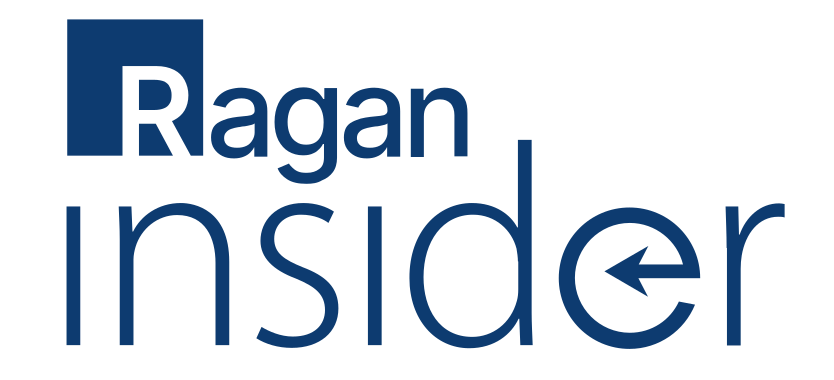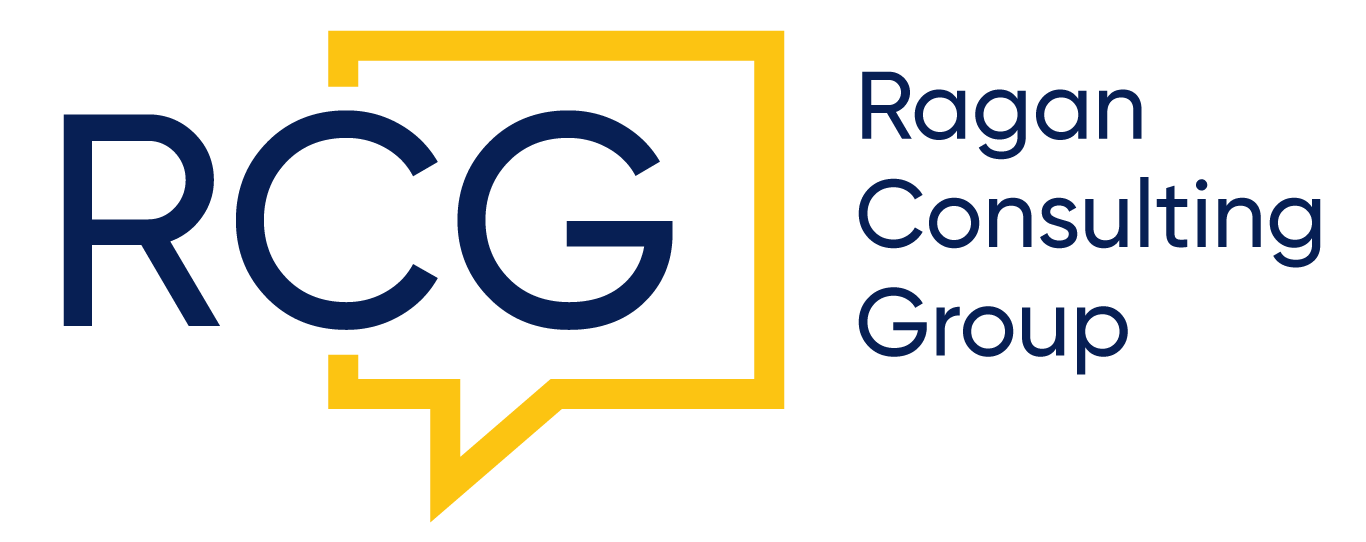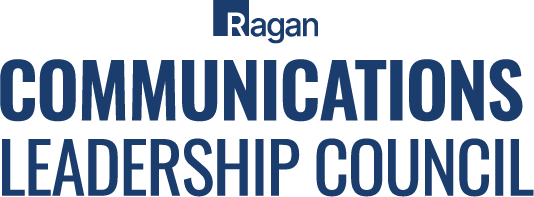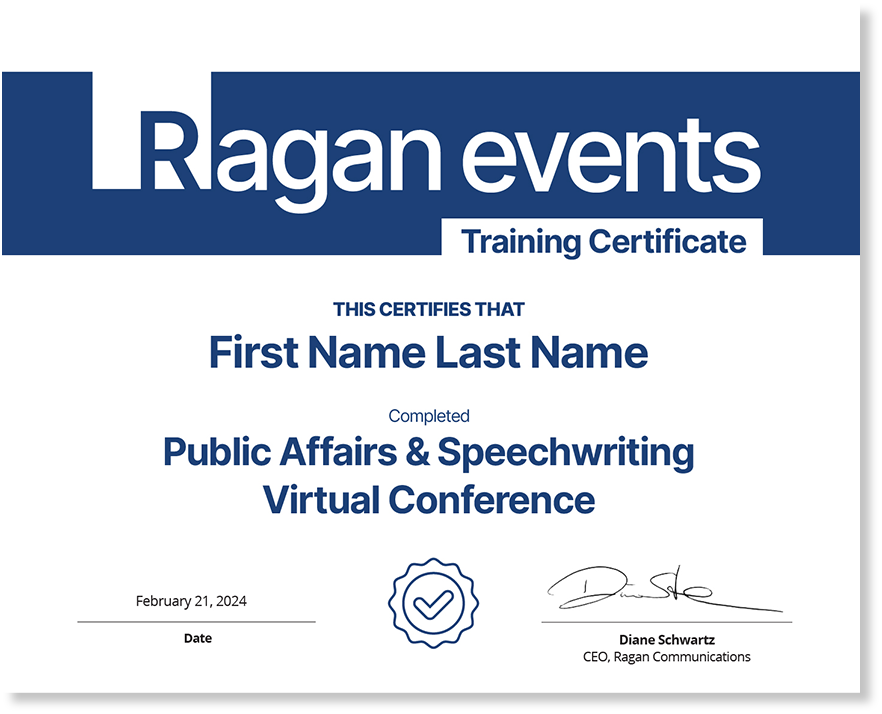Public Affairs
& Speechwriting Virtual Conference
New strategist to build trust, influence and impact
11 a.m.-3:30 p.m. ET
New strategies to build trust, influence and impact.
- Build bridges
- Restore trust
- Protect reputation
- Influence policy and opinions
- Engage stakeholders
- Control crises
- Counter misinformation
- Increase impact
Public affairs pros and speechwriters face a cascade of crises as our audiences struggle with uncertainty, bipartisanship, AI deepfakes, cybersecurity threats, weaponized disinformation and the unraveling of trust in our institutions.
The good news: You can help turn the tide, bridge divides and more confidently inform, inspire and influence your stakeholders with the strategies you learn at this Ragan virtual conference — just in time for what’s becoming an increasingly divisive election year.
Join to hear the latest insights and secrets of success firsthand from your peers as well as luminaries responsible for building consensus, connection and community around public policy issues.
Top reasons to attend this virtual conference:
- NETWORK AND LEARN: Learn from and interact with top public affairs execs, speechwriters, executive communicators and government communicators.
- SWOT ANALYSIS: A breakdown of the top opportunities and challenges facing the sector — and how to strategize for each.
- EXCLUSIVE SURVEY ACCESS: An embargoed look at our annual survey of public affairs pros, government communicators — and the public you serve (in partnership with Ragan, GWU and the National Association of Government Communicators).
Agenda
This virtual conference is your guide to what's new and what's working in public affairs and executive comms. Our 4.5 hour program will give you the strategies you need to influence policy, inform the public and build stronger stakeholder relationships.
Here’s your SWOT analysis deep-dive into the biggest opportunities and threats facing the sector — from the surge of AI to the capsizing trust in our institutions, organizations and execs. Featuring fresh, exclusive insights from our annual survey examining the state of government communications and public affairs conducted in partnership with GWU, Ragan and the National Association of Government Communicators, this kickoff session will uncover:
- Strengths: What’s working for successful public affairs programs, how others are modernizing their tech to lighten the load.
- Weaknesses: Bureaucracy, workload, shrinking budgets, siloed efforts, mis/disinformation, measuring ROI and more — plus how to address these issues.
- Opportunities: The return of in-person advocacy, using video and texting to drive mobilization, expanding staff training, using AI to help with messaging and more.
- Threats: Why Americans are worried about the 2024 elections, what the data says about the public’s lack of trust in government, business and the press and more.
- Social Media: Top platforms gov comms and public affairs pros are using for EOP (external official presence) — and how others are handling TikTok bans and more.
Change is the one constant in government and public affairs—especially in an election year when issues shift quickly. Yet many public affairs teams prefer to play it safe and stick with the same static content that fails to keep pace with the news cycle. Join this session to see how to break free from boring with an adaptable public affairs content strategy that keeps you relevant and in sync with sudden pivots in public perception, policies and preferences. You’ll learn:
- Adaptable content strategy: How The Aerospace Corp. team upshifted from 30-day approval cycles and boring press releases to owning the “Wild West of Space” by moving with agility and speed while embracing:
- A broadcast newsroom mindset (including hiring videographers).
- Long- and short-form video (including cutting-edge animation).
- Trend-driven media briefings (e.g., a media primer on AI and space).
- Cultural relevancy (e.g., framing content around “Our American Way of Life”).
- How to market shape: A step-by-step guide for defining a thought leadership platform that’s proactive and years ahead—instead of reactive.
- People over processes: How to tap into the passions of your SMEs to “think great thoughts” and deliver posts, programs and policies that impact real people.
- Diversity driving change: How DEI builds your “change power” so your team can be more inclusive, responsive and adaptable—plus how to tackle diversity fatigue.
- Agility through data: Measurement tools to unleash agile content—plus how data can help public affairs teams manage risk to ensure they’re not moving “too fast.”
Today’s audiences want more than wonky speeches full of scintillating soundbites, zingers and wow moments. What they want in these chaotic and uncertain times are simplicity and security. This session with leading speechwriters from the private and public sectors reveals how to deliver hope over hype with an authentic voice across all venues — from presentations and executive town halls for employees to social videos and press statements. We’ll cover:
- Authenticity: How to define your voice without spin, jargon or hype — including how to lean on numbers, anecdotes or other elements depending on your exec’s preferences.
- Passion: How to find your principal’s passion points and build trust by building stories and talking points around them — including how to craft and deliver a great anecdote.
- Storytelling: How to find stories and personal anecdotes that move audiences — lessons the "Lenny Skutnik moment."
- Solutions: How to apply a “Solutions Framework” to your executive comms to deliver the simple answers that your stakeholders want most.
- Security: Words, phrases, stats and stories that help convey a sense of security and optimism for the future — and how to add them to your executive comms toolkit.
- "CEOs as Coaches" Bonus: How to find optimism in a chaotic world — and deliver it in speeches.
AI presents a unique set of challenges and opportunities for Public Affairs professionals—this emerging technology will change both the way you work and the issues you work on, opening new lanes for creativity while raising new policy and legal issues that you’ll need to help your organizations navigate. As we work through this new technological evolution, our expert will help you consider:
- Enhanced efficiencies: How AI can help optimize your workday, support message and content creation, and improve engagement for your advocacy and initiatives.
- Targeted engagement: How to leverage AI for audience engagement, allowing you to reach key stakeholders with more personalized and relevant content.
- Issue management: How AI tools enable your ability to understand and respond to emerging issues, helping you stay ahead in comms and crisis management.
- Deepfake dilemmas: How to approach issues around AI-generated deepfakes — including potential faux political ads featuring your exec(s).
- Legal and policy challenges: A snapshot of the legal, policy and regulatory AI landscape to help you prepare.
In the volatile and rapidly evolving digital, economic and political landscape, communicators have seen their roles evolve to put them on the front lines of detecting and responding to cyber and digital threats. Today’s crises can become viral news stories in moments — whether it’s a brand crisis tied to misinformation, a natural disaster, a global conflict, a cybersecurity attack or worse. This session takes a page (pages, actually) from today’s public affairs emergency playbook to help you communicate through chaos, mobilize into action and protect your brand or the stakeholders you serve. You’ll learn:
- Crisis frameworks: How to revisit your playbook for crisis management to ensure you have insights into the vulnerabilities of key assets like customer loyalty, employee safety, and brand and reputation.
- Threat detection: The importance of early identification of threats so you can more effectively mitigate risks.
- Risk assessment: How to when to speak up, when to stay silent and when to bring other stakeholders into the fold so you can more effectively assess risks before they become crises.
- Prebunking: How to get in front of potentially damaging attacks and narratives — including how to develop holding statements for scenarios in advance.
- Effective mitigation strategies: Actions like prebunking narratives, exposing bad actors via the press and taking legal action based on illicit activity.
- Managing global forces: What to consider when operating internationally amid continued global conflict — and stateside during a divisive election year.
During the 36 years of this Ragan conference, attendees have heard from former White House and administration speechwriters dating back to President Ronald Reagan. In honor of that tradition, we’ve gathered an all-star panel of speechwriters to share their stories and insights — focusing on how to use "the language of leadership" to show authority, take responsibility and even speak out on potentially divisive topics, conflicts and even hot-button social issues. We’ll cover:
- The "Language of Leadership": Strategies and examples for showing authority, exemplary leadership and taking responsibility in times of crisis — including insights from an undelivered Eisenhower speech.
- Historical perspective: How speeches have changed — from yesterday's "speeches-as-entertainment" to today's multi-purposed content for fundraising, emails and even Instagram posts — and how organizations can adjust.
- WH alumni secrets and stories: Behind-the-scenes tales and techniques of presidential and government speechwriting.
- Emotions and empathy: How to “speak from the heart” to connect emotionally while prioritizing empathy and honesty around polarizing issues.
- Moving rhetoric: How metaphor, parallelism, anaphora, chiasmus (a JFK favorite) and other rhetorical devices can elevate and personalize speeches on sensitive topics.
- Trust or bust: How to communicate with clarity, transparency and consistency on topics where dis/misinformation must be countered at every turn.
- Personal branding advice: Career and thought leadership tips for speechwriters — how to build your brand, cred and career.
Social media shakeups are to be expected — but there's been a LOT of flux on top social platforms lately. That’s why public affairs pros aren’t just worried about growing their social media audience these days — they’re worried about retaining it. Join for ideas you can use to navigate the latest wave of social media changes, challenges and opportunities:
- Meta changes: How Threads, Instagram and Facebook are adjusting algorithms— and how to stay up-to-date without losing reach.
- Twitter/X ideas: What others are doing with their Twitter/X accounts as the platform evolves.
- TikTok wins: How others are experimenting with TikTok, plus what TikTok bans and concerns mean to public affairs.
- The others: Ideas for building a loyal following on other channels like LinkedIn, Threads, Reddit and more.
- Measurement matters: How to monitor your social media impact — from the best monitoring tools for public affairs purposes to the best KPIs to track
The standoff to name a House Speaker and ensuing 2024 budget showdown made it clear: “crossing the aisle” and “bipartisanship” have become four letter words in politics. Yet those in the trenches know that compromise is the best way to get to yes. Join to master the fine (yet disappearing) art of finding the middle so you can move your initiatives forward. You’ll hear how local, state and federal orgs alike are bridging divides on critical issues in a divisive election year. We’ll cover:
- A “Purple State of Mind”: How to communicate effectively with a divided public by focusing on building relationships instead of barriers.
- Inspiring examples: From overcoming the Glass and Bamboo Ceilings in politics to healing after BLM protests — how others are building unifying platforms.
- Inclusivity matters: How to improve the accessibility of your comms — and eliminate unconscious bias and divisive rhetoric from speeches and other channels.
- De-escalation strategies: Conflict resolution techniques communicators can use when audiences include hecklers, naysayers and provocateurs — online and IRL.
- Storytelling bonus: How to use authentic, personal storytelling to tear down barriers (stories you hear in this portion will be deeply personal, sometimes painful).
Employees, customers, stakeholders and the general public have come to expect leadership to step up and speak on issues ranging from corporate citizenship, social justice, workplace issues and pressing social and political topics. But doing so in a divisive election year can be a strategically delicate proposition. Join this closing, unvarnished talk to hear:
- The socio-political landscape: Issues on everybody’s minds now — plus how to assess and act on them.
- Authenticity and trust: Why, when and how to take the lead in social impact by speaking out on relevant issues.
- Your changing role: Why public affairs is in an era of increased influence and integration with other departments, the recent rise of employees as your #1 stakeholder — and what to do about these changes.
- What’s working: How others are “talking politics” or opining on issues with without stepping on landmines.
- Being a strategic counselor: How to advise execs, leadership or members on speaking out this election year.
- What CEOs really think: The truth from one of the nation’s leading social media (and social) platforms (who also instructs our next generation of public affairs leaders).
We’ll share the top tactics and strategies from the virtual conference so you can implement them for your organization.
Speakers
INTERESTED IN SPEAKING?
Please reach out to Moderator and Producer
Brian Pittman.
Top things you’ll learn at this conference:
- Hot-button backlash: How orgs did (or didn’t) speak out on the Israel/Hamas conflict — plus why/when/how to respond to issues ranging from gun control to abortion rights.
- New survey results: Top challenges and solutions to help overloaded teams build bridges during a divisive election year — as reported by thousands of your peers.
- Impactful rhetoric: How to elevate speeches and in-person advocacy with rhetorical devices like metaphor, parallelism, anaphora, chiasmus (a JFK favorite) and more.
- Ethical persuasion: Psychology techniques to create action-inspiring speeches that prioritize honesty and transparency without exploiting fears or misinformation.
- AI and deepfakes: How to enhance stakeholder engagement and legislative tracking with AI analytics and messaging — plus how to guard against deepfake threats.
- Inclusivity matters: How to effectively reach all segments in your communities or stakeholder groups with culturally appropriate messaging even amid DE&I clawbacks.
- PIO’s crisis playbook: Essential crisis and cybersecurity strategies — including risk assessment protocols, rapid-response incident management flowcharts and more.
- Solving for Twitter/X, Meta and TikTok: How to retain and reach stakeholders amid social media upheavals — from Twitter/X and Meta lawsuits to TikTok bans and more.
- Adaptable public affairs strategy: How to inform and influence new audiences and communicate change so it’s opportunity-based instead of fear-based.
- Misinformation, fake news and you: Bold solutions and myth-busting steps you can take now to restore public trust in your institution, organization or execs.
| VIP | Regular Rates | |
|---|---|---|
| Virtual Conference Registration | $999 | $1,099 |
| Virtual Conference Ragan Insider Member | $949 | $1,049 |
| Nonprofit/Gov Event Registration | $899 | $999 |
All attendees will receive the recording of the event.
Group Discounts
Would you and your team like to attend? Group pricing is available when registering! Contact Shallon Blackburn for more information.
RAGAN COUNCIL MEMBER DISCOUNTS
Membership includes free registration passes. Contact Shallon Blackburn for more information on becoming a member.

RAGAN INSIDER DISCOUNTS
Insiders save on all Ragan events. Not a Ragan Insider? You can become one during registration for this event!
Phone registrations and group pricing: For group orders, please contact our customer service team at 800-878-5331 or cservice@ragan.com
Register to secure your spot today! Don’t miss this opportunity to:
- Access exclusive content and resources.
- Connect with your peers.
- Get the ideas & tools to stay ahead in today’s rapidly changing world.
Register today. Once registered, you’ll be able to join the private LinkedIn group right away.
- Second Annual “GPA: Government Communicators Study”
- Annual Quorum State of Public and Government Affairs Report
- Benefits and Risks of GenAI: State of CA Report
- Speechwriters Inclusive Language Toolkit
- The Tech Stack You Need to Stay On Top of Upcoming Elections
Sponsors & Partners
Want to become a sponsor? Get in touch with our team to discuss sponsorship opportunities.
Who Should Attend?
You should attend if you spend at least a quarter of your time in any of these areas:
Public affairs • Executive Communications • Speechwriting • Government Relations • Public Information • Reputation management • Crisis communications • PR • Internal Communications • Issues Management • Social media • Storytelling • Writing • Media relations
Get Recognized!
Each registration comes with a personalized "Public Affairs & Speechwriting Virtual Conference" Certificate of Completion for attending.
WONDERING IF YOU SHOULD ATTEND?
Here’s what past attendees are saying about Ragan and PR Daily Events!





























